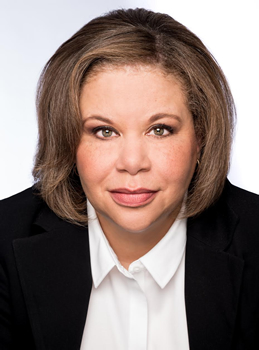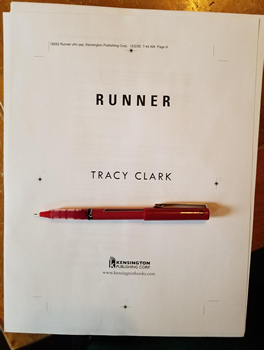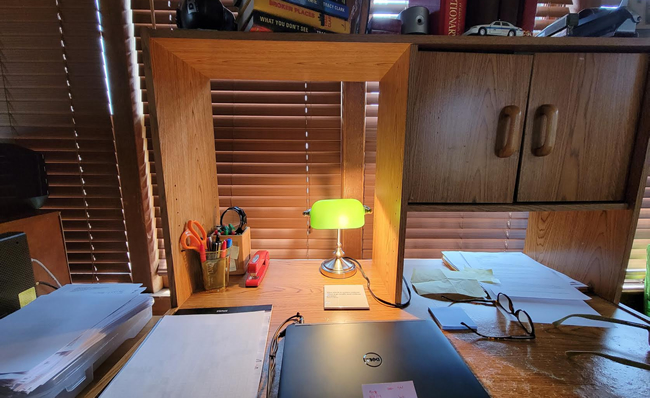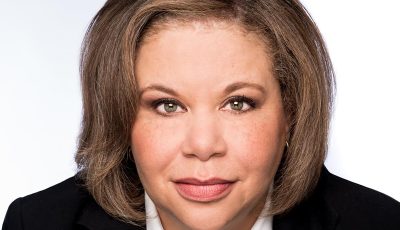

On the Cover: Tracy Clark
Digging for Character Gold
Cassandra Raines, the cop-turned-private investigator who leads author Tracy Clark’s Chicago Mystery series, is relentless. She won’t back away from a challenge, and she won’t turn her back on someone who needs her help. She’s learned from the trials of those who’ve come before her, and she gives back to the tight-knit community that lifts her up.
In other words, Cass Raines is a lot like her creator.
Clark, who still works as a newspaper editor in her native Chicago, calls herself “an overnight success 20-some years in the making”—a reference to the two decades she spent honing her craft and piling up completed Cass Raines novels before she got the news so many writers dream of: a publisher had snatched up all three books, at auction, in a package deal.
Clark’s persistence paid off. The first Cass Raines mystery, Broken Places, was published in 2018 to widespread critical acclaim. Borrowed Time came next in 2019, and What You Don’t See followed in 2020. Between them, those three titles racked up nominations for a number of major genre awards, a bevy of starred reviews, and a coveted Sue Grafton Memorial Award.
Expectations are high, then, for RUNNER, the fourth installment in Clark’s series. This entry finds Cass on the trail of Ramona Titus, a young runaway who has spent years in the city’s foster system. Ramona has uncovered a secret that someone will go to extraordinary lengths to keep hidden, and Cass soon finds herself in a race against time to get to Ramona before someone else does.
While Clark has plans to continue the Cass Raines series, she’s also branching out. In March, trade journals announced the sale of Hide, a standalone thriller about a Black female police officer on the hunt for a serial killer.
A few days before the release of RUNNER, Clark joined The Big Thrill for a wide-ranging discussion about her lifelong love of noir fiction, her grueling path to publication, and her pivotal mentorship with Eleanor Taylor Bland, author of the groundbreaking Marti MacAlister mysteries.
The first three Cass Raines novels were very well received, and you’ve built a loyal reader base. What kind of pressure do you feel when it’s time to write a new installment?
It’s the same pressure each time, I’m afraid. I want to write good stories and engaging characters. I want readers to enjoy Cass’s adventures and want to follow her along, so the pressure is on for me to dig deep into all I’ve learned about craft up to this point and apply it effectively. No one’s ever going to write the perfect book because there is no such thing, but I really want to write a good book, to give readers an enjoyable experience and have at least a little fun while I’m doing it. The pressure is definitely self-inflicted, but that can be a good thing too. It keeps me focused and on my toes. The act of writing is a leap into the unknown.
What are some factors you consider when you’re looking for Cass’s next case?
Usually midway through a Cass book, I start thinking about the next one and begin to fish around for ideas. I may find it in a small news item on page 19 of the local newspaper, I may find it on the nightly newscast, or I may overhear a snippet of conversation somewhere that might start the wheels turning. I keep myself open to whatever comes. Ideas for stories can pop up from almost anywhere. Ideally, I want an idea that has some legs to it, one that I can apply to Cass’s emotional arc, and one that says something significant about the human condition. It’s really got to have some emotional heft to it, some resonance. Once I’ve found whatever that is, then I have to figure out how to bring it down to the character level and tell the truth about it.
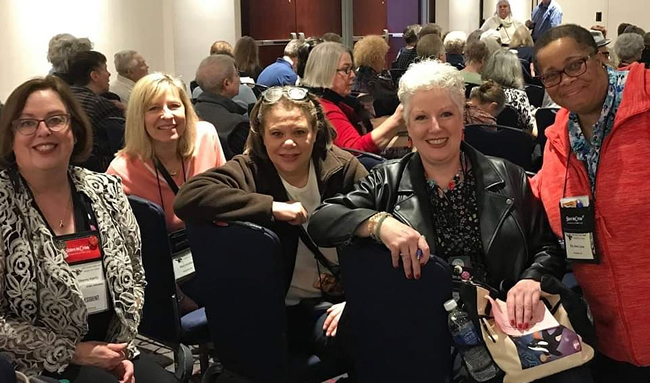
Clark finds her people at one of her first writers’ conferences as a published author. From left: Sherry Harris, Mary Keliikoa, Clark, Julie Hennrikus, and Dru Ann Love. “You couldn’t ask for a nicer bunch of folks,” Clark says.
Cass is by no means a lone-wolf detective, and her relationships, from foundational ones with friends, family, and her ex-partner, to casual ones with the staff of her favorite diner, are among the great joys of the series. Can you talk about why it’s important to ground Cass so firmly in her community?
I think she’d do just fine as a lone-wolf detective, but those around her just won’t give her that option. Her cobbled-together family stays close. As to her being grounded firmly in her community, that’s intentional. Cass is African American, she’s female, she’s smart, she’s a South Sider—she’s a lot of things, and all of those things inform her perspective on the city she lives in, the people she claims as her own, and the problems and issues they face in today’s world. Putting her in the community she claims gives me a hundred directions I can go in story-wise. I like having that range. I like being able to move Cass around and make her uncomfortable. It’s interesting to have her face the same things we all face out in the real world and then to see how she handles herself. Her perspective is unique, I think, in PI fiction. She may do the same work as Kinsey Millhone, but she is not Kinsey Millhone. Different worlds entirely.
Has writing the Cass Raines novels made you look at Chicago any differently?
I’ve been here all my life. This is my city, and still I learn new things about it every day as I look around for places to set scenes and dump bodies (fictionally). Chicago has an interesting history and a really cool vibe, and the people who are from here and live here cannot be mistaken for anyone else living anywhere else. I do look at the city more closely now because I’m looking for ways to vividly show it to readers, and I see things now that I may have blithely walked past a million times, so it’s almost like discovering the city for the first time. I’ve barely scratched the surface, I think.
I’ve read that you made the leap from Nancy Drew novels to hardboiled authors such as Hammett and Himes when you were quite young. What initial impression did those noir tales make on you?
I loved them. There was just something about these dark stories that always took place on the wrong side of town where everything was high stakes and dangerous that just intrigued the heck out of me. And always at the center were hardened PIs who lived on the edge, and you were never quite sure what side they came down on. Who were they really? What motivated them to act, albeit reluctantly, when others wouldn’t? These characters aren’t all good nor are they all bad, they are situational in a lot of cases … also intriguing. I absolutely loved the ambiguity even back then when I’m pretty sure I wasn’t getting the full scope of the portrayal. Now I get it, and I’m lucky to have a chance to play around with all of that on the page. Best part, I think, is that these characters live in the gray areas. Nothing’s absolute—right, wrong, injustice, justice. I get jazzed just thinking about it. All this richness leaves so many places to dig for character gold.
How did it feel years later, when you finally found Black women authors who wrote about Black women detectives?
It was like Christmas morning and my birthday all rolled into one. I had certainly tapped into writers like Sue Grafton, Margaret Maron, Marcia Muller, Linda Barnes, and Sara Paretsky in the early ’80s, but a decade later when female crime writers of color like Eleanor Taylor Bland, Valerie Wilson Wesley, Paula L. Woods, and Penny Mickelbury showed up and I could finally read stories with women who looked like me as starring characters, it was mind-blowing! These characters weren’t the sassy sidekick or the funny friend, they were the heroines, the smart ones who solved the cases and took all the chances. They were familiar and complicated, competent and gutsy. The fact that these writers were out there writing these women gave me the confidence to really buckle down and write one of my own. I wanted to do that, and I was going to do it if it took me a thousand years. There would likely be no Cass Raines without Taylor-Bland’s Marti MacAlister, Woods’s Charlotte Justice, or Valerie Wilson Wesley’s Tamara Hayle. In fact, I know there wouldn’t be.
Your website bio says you’re “an overnight success 20-some years in the making.” I love that. Can you tell me a little about your path to publication?
True. By the time I signed my first publishing contract, I’d been crawling in the trenches for decades. I was battle scarred and unrelenting. I had been knocked down numerous times, but I always got back up, dusted off, and started again. In order for “the business” to stop me, they were literally going to have to club me in the head.
Though I’d always written as a kid, little stories in my little kid notebook, I began to actively focus on writing a book in my early twenties. I had no idea what I was doing. I’d finish a manuscript, think it was done, and then send it out to agents, getting that dreaded rejection letter back weeks later. I’d get a nibble, a second look on occasion, but then my hopes would be dashed when the agent would ultimately take a pass. It went on like that for years, but I just kept writing. I finally got an agent, but he turned out not to be the right one for me. We limped along together for two years without any success, and then we finally parted ways. It was a setback, discouraging at the time, and I was still several years from publication. But I just kept writing. I always knew that I wanted Cass Raines to be a series character, so when I couldn’t get any takers for the first book, I pushed it aside and started on the second. When I couldn’t get any takers for the second, I stacked it on top of the first book and started on the third. I just kept writing.
The great thing about that is that the more I wrote, the more I learned, and the more I learned the better I got. None of the writing was wasted effort. When I finally got another shot at an agent, I was ready, and I not only had Broken Places to offer but also Borrowed Time and What You Don’t See. All three sold together. It took a lot of persistence to keep moving forward as those rejection letters piled up, but I knew that to get what I wanted I had to put in the work and teach myself what I didn’t know. I had to keep getting better. I attended a writing workshop once where one of the participants, a “pre-published” writer like me, asked the session moderator, “What’s the best way to get published?” The answer was simple: “Write a good book.” That answer was unsatisfactory at the time. All us newbies were looking for that magic bullet, that secret element, but the answer stuck with me. So, during all those lean years, I concentrated on writing a good book. I studied the craft of writing. I practiced pacing and setting, character development and world-building. I read a lot and wrote a lot. I turned the words this way and that, revising, digging deeper, finding different, interesting ways to put the words down on paper.
In the end, it took as long as it was supposed to take, I suppose. If I hadn’t been rejected all those times before, I wouldn’t have had all those years of practice and I wouldn’t have been ready when my time finally came around. I’m still learning. I don’t think any writer gets to a point where he or she feels as if they have nothing else to learn, and I kind of like that too. Now I can look back at all those years when nobody would give Cass Raines the time of day and just smile. Persistence pays off, my friends. Keep going!
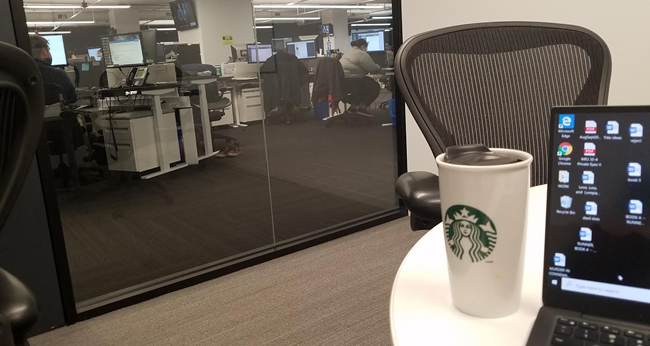
Pre-pandemic, when Clark was still working at the office, this tiny room was where she wrote during her lunch hour. On the other side of the glass, staffers sold and placed ads and obits for the paper.
I understand you were mentored by the legendary Eleanor Taylor Bland. How did that relationship come about, and how did it shape your work?
Eleanor Taylor Bland was a mentor to so many, not just me. She was passionate about encouraging new writers, particularly writers of color, and always seemed to go out of her way to gather them in, support them, advocate for them. I was still in college when I met her at one of my first writers’ workshops. I could have counted on three fingers the number of African American writers registered for the event, so it wasn’t all that difficult for Eleanor to spot me sitting in the back of one of her sessions. She came up to me afterward, she was very direct, and wanted to know who I was, what I was writing, and how it was going. That’s when the whining started (mine, not hers). “It’s not going well,” I told her. “I have absolutely no idea what the heck I’m doing!” I wailed. “What the %&* is pacing, anyway?!” I remember her steady gaze. Then she told me to follow her to her next session.
That was it.
She folded me into the community, though I hadn’t written anything but trash up to that point. She walked me around introducing me to real writers, famous writers. She read my manuscript pages and didn’t laugh out loud. She offered an inciteful critique, then gave me her number and email address and told me to send her my revisions so she could look at them. A friendship developed.
I got my first agent through Eleanor. I got my first short story published in an anthology through Eleanor. We’d email back and forth, and I’d call her with a story problem, hoping she was at home and had the time to help a sister out. When Eleanor called me, she would always talk to my mother first.
Sometimes God drops angels into your life right when you need them. Eleanor made me feel that all things were possible with my writing. She saw talent in me and told me so, just when I needed that validation.
Writing is hard. It’s easy to give up and to convince yourself you suck at it. Eleanor told me I was good, impressive even. It meant the world, then and now.
I encourage young writers today because Eleanor encouraged me. I tell them all to just keep writing. Those were Eleanor’s words to me, and I can still hear her saying them. Yes, Eleanor was my mentor, but she was a light in so many other lives too. I thanked her profusely then and honor her support today by paying it forward in my writing community. She’d love that.
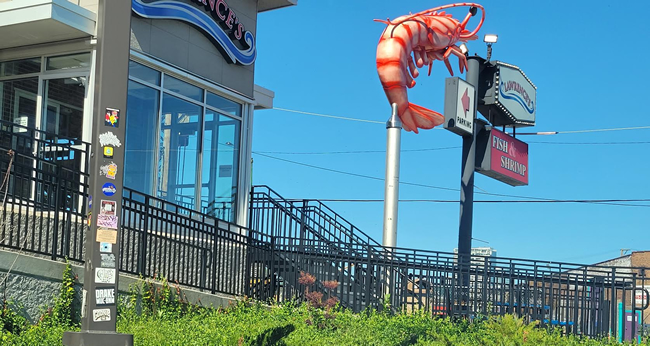
A tentative location for Clark’s next book. “Looks innocuous,” she says, “but just to the left, out of frame, down a short scruffy embankment, is access to a small, smelly canal. Good place to dump a fictional body.”
What does a typical writing day look like for you?
I rise with the chickens at 5:30 am, although now that I’m saying that, I have no idea when chickens actually rise. Anybody know when chickens get up? Anyway, I’m up at 5:30 and I write until about eight. That’s my writing time. I still have a day job, so after a quick breakfast, usually a bowl of Cheerios, I swivel over to that. If I can sneak in another hour of writing at the end of the day, I do. If not, I’m back at it the next morning at 5:30. I do that every day, though I may take the occasional Sunday to recharge. The funny thing is that once you’ve set your writing schedule, your brain learns to show up at just that time ready to work. If I’m still in bed at 5:30, my brain will start writing without me. Scenes will begin to form, bits of dialogue will run on a loop—that’s my cue to get up and get down to my desk. No alarm clock needed.
What’s in your nightstand book stack right now?
What’s not in it! I read far too slowly to satisfy me because I’m having to fit reading into a jam-packed day of writing and working and writing some more. But on my nightstand now are five books for a panel I will be moderating in a few weeks. Can’t wait to get to those. They all look fabulous! I’m also reading Cynthia Pelayo’s fantastic Children of Chicago, an ARC of the great Lori Rader-Day’s Death at Greenway, mesmerizing. I also have Hannah Mary McKinnon’s You Will Remember Me on the stack, Hank Phillippi Ryan’s The First to Lie, and Naomi Hirahara’s first Ellie Rush novel Murder on Bamboo Lane. It’s like a freaking master class in suspense, and I can’t wait to dive in! There are so many good books out there that I wish I could just absorb them all at once, but slow and steady is how I’ve got to do it.
Finally, can you tell me anything at all about Hide?
It’s my first standalone novel, and Cass is not in it. The book’s still set in Chicago, though, because that’s where I hang out. Third person perspective instead of first, so the voice is a lot different. I am working with an entirely new cast of characters that I’m still learning about. I’m one draft in and shaping it up as we speak. My main character is an African American female cop who, along with her fellow detectives, must find a killer whose victims are hidden—under a bridge, under a pile of leaves, etc. It’s a lot darker than the Cass books, more suspenseful (I hope). It’s a little exciting to go dark; not sure what that says about me. Part of my challenge with Hide is that Cass is still rolling around in my head. She tries to creep into the story, even though it’s not hers to tell. I’m constantly having to beat her back and tell her it’s not her time yet, that I’ll get back to her later. She is impatient … and a little forceful. Anyway, Hide is coming along nicely. It releases in December 2022, and my fingers are crossed that it finds its readers.
- Africa Scene: Iris Mwanza by Michael Sears - December 16, 2024
- Late Checkout by Alan Orloff (VIDEO) - December 11, 2024
- Jack Stewart with Millie Naylor Hast (VIDEO) - December 11, 2024


